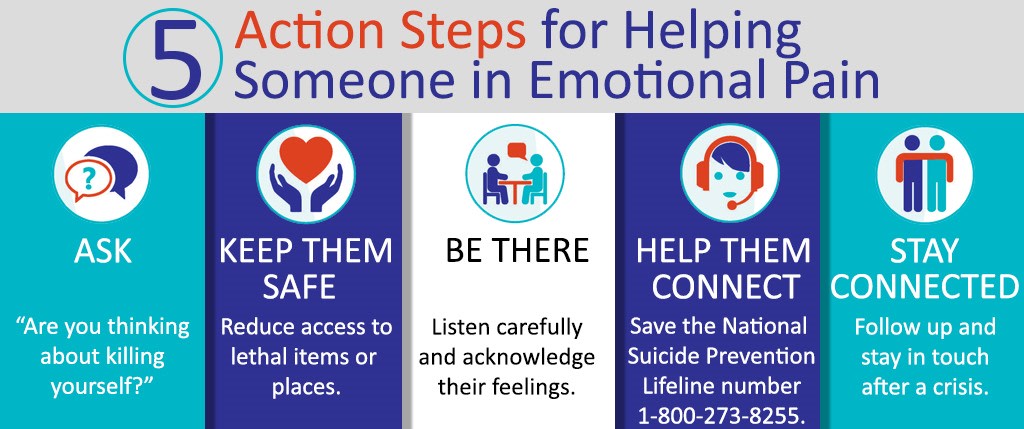Emotional Pains of Life
#BeThe1To Help Someone In Emotional Pain

How to Help Someone in Emotional Pain
Be the one to help someone in emotional pain.
Please read and share. Any proceeds earned from vocal.media viewership reading this article will be donated to local, state and national Suicide Prevention.
Before I share some information on how to help someone in emotional pain, I wanted to share some short stories about some personal pains from long ago and in some recent painful times of strife.
The emotional pains of life are sure to be part of everyone’s story and sure to hit close to home as did in my family when I was a kid growing up. My family lost a loved one due to circumstances involving emotional pain. I never met my grandpa but was told he took his own life. My mother and aunt told me he had recently returned home from a doctors visit which supposedly went OK, that he was on some medicine that may have contributed to his emotional paint but that he then went outside and shot himself with his rifle. Of course, in most stories the actual cause of death could be debated. Bear in mind that after many years the stories have evolved some and maybe embellished.
As a kid I remember my cousin who died from an accidental shooting while trying to help a friend during some emotional times. I also lost a sister to an accidental overdose, or that’s what the official ruling was but when you think about it when taking a substance more than what’s prescribed or inflicting harm through eating bad foods and not exercising, like I’ve been doing, can surely put anyone into emotional pain and reduce anyone’s life span.
The other story about my personal emotional painful moment was when dealing with a recent separation and divorce. Some bad days and good days, biting my tongue for real and so to speak but channeling the painful times into work, support groups, volunteering to help others and leisure activities. Thankfully the pain and hurt isn't permanent. It still hurts from time to time. If someone were to say they’ve never thought about pain and stuff, then they are probably lying.
The thought of it or any unhealthy thoughts may try to creep into my mind, but I choose to redirect them into better ones. Thoughts turn to healthy actions of helping others, providing for my family whether it be splintered or not and gaining some healthy and wise behaviors, routines like daily reading, working out, giving an honest days work and moderate relaxing time. Even a few minutes of doing nothing except breathing and relaxing helps.
Today I occasionally think and feel emotional pains, but turn my thoughts to better ones with hope and being more vigilant in case I see others who are in the same or similar emotional pain to be ready to console, comfort, and if need be direct them to some better alternatives than to anything other than clutching onto emotional pain.
Information gathered from reliable source which I’ve been given permission to share came from www.BeThe1to.com. There are many other local, state, and national sources you can easily find online.
There is an average of 123 suicides each day in this country. An estimated 22 Veteran Suicides every day. Suicide is the tenth leading cause of death in America —second leading for ages 25 to 34, and third leading for ages 15 to 24. Let us all strive to reduce these numbers through awareness, knowing the signs, and reaching out to help others find a safety net.
10 Warning Signs of Suicide
1. Previous suicide attempts
2. Recent suicide of a friend or relative
3. Threats of suicide
4. Depression
5. Changes in personality or behavior
6. Increased use of drugs and/or alcohol
7. Behavioral disturbances
8. Psychiatric illness
9. Preparation of death
10. A sudden lift in spirits
The five action steps for communicating with someone who may be suicidal are supported by evidence in the field of suicide prevention. ASK, KEEP THEM SAFE, BE THERE, HELP THEM CONNECT, STAY CONNECTED.
ASK—“Are you thinking about killing yourself?”
KEEP THEM SAFE. Reduce access to lethal items or places.
BE THER. Listen carefully and acknowledge their feelings.
HELP THEM CONNECT. Save the National Suicide Prevention Lifeline Number 1-800-273-8255.
STAY CONNECTED. Follow up and stay in touch after a crisis.
For access to services and immediate crisis help in Georgia, call the Georgia Crisis and Access Line (GCAL) at 1-800-715-4225, available 24/7.
US Department of Veterans Affairs Veterans Crisis Line—We’re here anytime, day or night—24/7. If you are a Veteran in crisis or concerned about one, connect with our caring, qualified responders for confidential help. Many of them are Veterans themselves.
Call 800-273-8255 and press 1.
Text 838255 .
Start a confidential chat .
Call TTY if you have hearing loss 800-799-4889.
Get more resources at www.VeteransCrisisLine.net
Please read and share. Any proceeds earned from vocal.media viewership reading this article will be donated to local, state and national Suicide Prevention Lifelines.
Be the one to help someone in emotional pain.






Comments
There are no comments for this story
Be the first to respond and start the conversation.